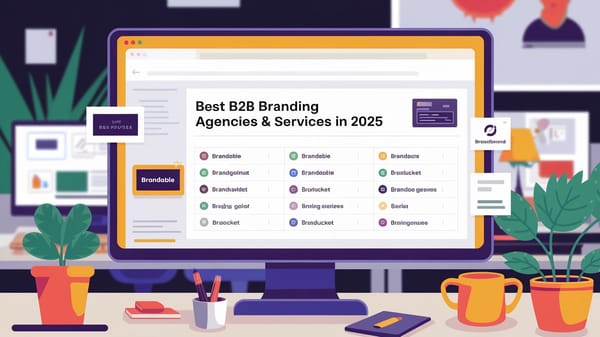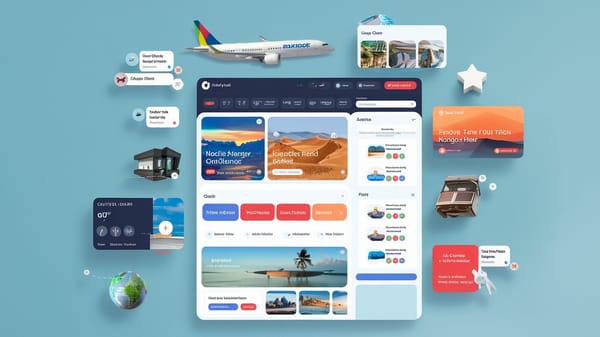Top 10 Benefits of B2B Apps

Business-to-Business (B2B) applications have emerged as pivotal tools for enhancing operational efficiency and fostering robust business relationships. As companies strive to maintain a competitive edge, the adoption of B2B apps has become increasingly prevalent, offering a myriad of advantages that streamline processes and drive growth. This report delves into the top ten benefits of B2B apps, providing a comprehensive analysis of how these digital solutions are transforming the business ecosystem.
B2B apps are designed to facilitate seamless interactions between businesses, enabling them to manage transactions, communications, and collaborations with greater ease and precision. These applications are not only instrumental in reducing operational costs but also in enhancing productivity by automating routine tasks and providing real-time data insights.
You can also visit Oncely.com to find more Top Trending AI Tools. Oncely partners with software developers and companies to present exclusive deals on their products. One unique aspect of Oncely is its “Lifetime Access” feature, where customers can purchase a product once and gain ongoing access to it without any recurring fees. Oncely also provides a 60-day money-back guarantee on most purchases, allowing customers to try out the products and services risk-free.
Oncely are hunting for the most fantastic AI & Software lifetime deals like the ones below or their alternatives:

Table of Contents
- Understanding B2B Apps
- Definition and Scope
- Market Growth and Trends
- Key Features of B2B Apps
- Importance of B2B Apps in Modern Business
- Challenges and Considerations
- Future Outlook
- Key Benefits of B2B Apps for Businesses
- Scalability
- Enhanced Customer Loyalty
- Real-Time Analytics and Data-Driven Decisions
- Operational Efficiency and Cost Savings
- Improved Communication and Collaboration
- Increased Revenue and Market Opportunities
- Conclusion
- Future Trends in B2B App Development
- Integration of Artificial Intelligence and Machine Learning
- Adoption of Serverless Architecture
- Emphasis on Omnichannel Experiences
- Utilization of Blockchain Technology
- Focus on Big Data and Analytics
- Conclusion
Understanding B2B Apps
Definition and Scope
Business-to-Business (B2B) applications are software solutions designed to facilitate transactions and interactions between businesses. Unlike Business-to-Consumer (B2C) apps, which target individual consumers, B2B apps focus on providing tools and services that enhance business operations, improve efficiency, and foster collaboration between companies. These applications can range from customer relationship management (CRM) systems to supply chain management tools, enterprise resource planning (ERP) software, and more. The primary goal of B2B apps is to streamline business processes, reduce costs, and improve productivity.
Market Growth and Trends
The B2B app market has experienced significant growth over the past decade, driven by the increasing need for digital transformation across industries. According to a report by Statista, the global B2B software market was valued at approximately $390 billion in 2023 and is projected to reach $500 billion by 2026. This growth is fueled by the rising adoption of cloud-based solutions, the need for real-time data analytics, and the increasing importance of remote work solutions. Additionally, the integration of artificial intelligence (AI) and machine learning (ML) into B2B apps is expected to further drive market expansion by offering enhanced data processing capabilities and predictive analytics.
Key Features of B2B Apps
B2B apps are characterized by several key features that distinguish them from other types of software solutions:
-
Customization and Scalability: B2B apps are often highly customizable to meet the specific needs of different businesses. They are designed to scale with the growth of a company, allowing for the addition of new features and functionalities as required.
-
Integration Capabilities: These apps are built to integrate seamlessly with existing business systems and processes. This includes compatibility with other software solutions, such as ERP and CRM systems, to ensure a cohesive digital ecosystem.
-
Security and Compliance: Given the sensitive nature of business data, B2B apps prioritize security and compliance with industry standards and regulations. This includes features such as data encryption, user authentication, and regular security updates.
-
User Experience and Interface: While B2B apps are designed for business users, they still emphasize user-friendly interfaces and intuitive navigation to enhance user experience and adoption rates.
-
Analytics and Reporting: B2B apps often include advanced analytics and reporting tools that provide businesses with insights into their operations, helping them make data-driven decisions.
Importance of B2B Apps in Modern Business
B2B apps play a crucial role in modern business operations by offering several benefits:
-
Efficiency and Productivity: By automating routine tasks and streamlining workflows, B2B apps help businesses operate more efficiently. For example, a Forrester study found that companies using CRM systems saw a 15% increase in productivity.
-
Cost Reduction: B2B apps can significantly reduce operational costs by minimizing manual processes and reducing the need for physical infrastructure. Cloud-based solutions, in particular, offer cost savings by eliminating the need for on-premises hardware.
-
Improved Collaboration: These apps facilitate better communication and collaboration between businesses, enabling seamless information sharing and joint project management. Tools like Slack and Microsoft Teams have become essential for remote work environments.
-
Enhanced Customer Relationships: CRM systems and other customer-focused B2B apps help businesses manage and nurture their client relationships more effectively, leading to increased customer satisfaction and loyalty.
-
Data-Driven Decision Making: With access to real-time data and analytics, businesses can make informed decisions that drive growth and competitiveness. B2B apps provide the tools necessary to analyze market trends, customer behavior, and operational performance.
Challenges and Considerations
Despite their benefits, B2B apps also present certain challenges that businesses must consider:
-
Implementation and Integration: Integrating new B2B apps with existing systems can be complex and time-consuming. Businesses must ensure that their IT infrastructure is capable of supporting new software solutions.
-
User Adoption: Ensuring that employees are adequately trained and comfortable using new B2B apps is crucial for successful implementation. Resistance to change can hinder the adoption of new technologies.
-
Data Security: As B2B apps handle sensitive business data, ensuring robust security measures is essential to protect against data breaches and cyber threats.
-
Cost of Ownership: While B2B apps can reduce operational costs, the initial investment and ongoing maintenance costs can be significant. Businesses must carefully evaluate the total cost of ownership before implementation.
Future Outlook
The future of B2B apps is promising, with continued advancements in technology expected to drive further innovation. The integration of AI and ML will enhance the capabilities of B2B apps, providing businesses with more sophisticated tools for data analysis and decision-making. Additionally, the growing importance of sustainability and corporate social responsibility is likely to influence the development of B2B apps, with a focus on solutions that support sustainable business practices.
In conclusion, B2B apps are an essential component of modern business operations, offering numerous benefits that enhance efficiency, productivity, and competitiveness. As the market continues to evolve, businesses must stay informed about the latest trends and technologies to leverage the full potential of B2B apps.
Key Benefits of B2B Apps for Businesses
Scalability
B2B apps significantly enhance the scalability of businesses by streamlining operations and facilitating growth. Internally, these apps automate and improve business processes, such as onboarding and training, which is crucial when planning to expand the workforce. For instance, if a company plans to hire 50 new employees over 18 months, a B2B app can simplify onboarding and training, making the process more efficient (BuildFire).
Externally, B2B apps can drive revenue growth by simplifying transactions with business customers. For example, a company selling wholesale goods can use an app to streamline the ordering process, allowing customers to place orders with just a few clicks, thus reducing the need for traditional methods like phone calls or faxing (BuildFire).
Enhanced Customer Loyalty
B2B apps play a crucial role in building long-term customer relationships by providing constant accessibility and personalized experiences. These apps allow businesses to be just a click away from their customers, offering a level of accessibility that other channels cannot match. Loyalty programs integrated into B2B apps encourage customers to spend more to reach milestones or save money, fostering a sense of loyalty (BuildFire).
Moreover, for SaaS products, B2B apps become indispensable tools for business users, who rely on them for specific processes, ensuring long-term usage and customer retention (BuildFire).
Real-Time Analytics and Data-Driven Decisions
B2B apps provide businesses with fast access to real-time data, which is essential for making informed decisions. This capability allows companies to analyze customer behavior, preferences, and pain points, enabling them to tailor their offerings and improve customer satisfaction (Webomindapps).
The integration of analytics tools within B2B apps helps businesses monitor key performance indicators (KPIs) and implement data-driven strategies. This not only enhances operational efficiency but also supports strategic decision-making processes (Webomindapps).
Operational Efficiency and Cost Savings
B2B apps streamline business operations by automating various tasks, such as inventory management, invoicing, and project management. This automation reduces manual labor costs and minimizes errors, leading to significant improvements in efficiency and productivity (Webomindapps).
Additionally, B2B apps facilitate supply chain management by providing a centralized platform for procurement and supplier management. This results in cost minimization, better quality control, and timely delivery of goods and services (Webomindapps).
Improved Communication and Collaboration
Effective communication and collaboration are vital for business success, and B2B apps offer various tools to enhance these aspects. Features such as instant messaging, video conferencing, and real-time interaction reduce delays and improve productivity. These apps also support project management and file sharing, streamlining workflows and increasing efficiency (Webomindapps).
B2B apps enable businesses to communicate effectively both internally and externally, resulting in better outcomes and increased customer satisfaction. They provide platforms for collaboration, allowing team members to work together seamlessly, exchange messages, and coordinate efforts (Webomindapps).
Increased Revenue and Market Opportunities
B2B apps open up new revenue streams by enabling businesses to sell products and services through multiple channels, such as online marketplaces and mobile apps. This broadens the audience reach and directly boosts sales volume (Webomindapps).
Furthermore, B2B apps provide deep insights into customer behavior, choices, and preferences, offering opportunities for cross-selling and up-selling. Real-time data on competitors' pricing allows businesses to dynamically adjust their pricing strategies, maximizing revenue and improving sales (Webomindapps).
Conclusion
B2B apps are indispensable tools for modern businesses, offering a wide range of benefits that enhance scalability, customer loyalty, operational efficiency, and revenue growth. By leveraging these apps, businesses can streamline operations, improve communication, and make data-driven decisions, ultimately leading to increased profitability and market competitiveness.
Future Trends in B2B App Development
Integration of Artificial Intelligence and Machine Learning
The integration of Artificial Intelligence (AI) and Machine Learning (ML) is revolutionizing B2B app development by enhancing user experiences and operational efficiencies. AI-driven personalization is becoming a cornerstone in B2B applications, allowing businesses to tailor their offerings to individual customer needs. This trend is evident in the increasing use of AI for customer assistance, decision-making, and operational performance improvements (Facile Technolab).
AI and ML are also being utilized to analyze user behavior, enabling dynamic content creation and personalized recommendations. This hyper-personalization approach is akin to the recommendation systems used by consumer platforms like Netflix, but tailored for B2B environments. The ability to predict customer needs and automate responses is expected to significantly enhance customer satisfaction and loyalty.
Adoption of Serverless Architecture
Serverless architecture is gaining traction in B2B app development due to its scalability and cost-efficiency. This architecture allows developers to focus on writing code without worrying about server management, leading to faster deployment and reduced operational costs. The serverless model supports the dynamic scaling of applications, which is crucial for handling varying loads and ensuring seamless user experiences (Facile Technolab).
By adopting serverless architecture, B2B apps can achieve higher availability and reliability, which are critical for maintaining business continuity. This trend is particularly beneficial for startups and small businesses that need to optimize resources while scaling their operations.
Emphasis on Omnichannel Experiences
The demand for seamless omnichannel experiences is reshaping B2B app development. Businesses are increasingly integrating various digital touchpoints to create a unified customer journey across multiple platforms. This approach not only enhances customer engagement but also provides valuable insights into customer behavior and preferences (BetterCommerce).
Omnichannel strategies involve the synchronization of online and offline channels, ensuring that customers receive consistent information and services regardless of the platform they use. This trend is driving the development of apps that can seamlessly integrate with existing systems and provide real-time data synchronization.
Utilization of Blockchain Technology
Blockchain technology is emerging as a transformative force in B2B app development, particularly in enhancing security and transparency. Blockchain's ability to provide secure, immutable records makes it ideal for managing operational supply chains and executing smart contracts. These self-executing contracts reduce the need for intermediaries, streamline processes, and minimize the risk of fraud (Peer to Peer Marketing).
The integration of blockchain in B2B apps is expected to grow significantly, with projections indicating a market expansion to $10 billion by 2025. This growth is driven by the need for secure transactions and efficient contract management in complex B2B environments.
Focus on Big Data and Analytics
Big data and analytics are becoming integral to B2B app development, enabling businesses to make data-driven decisions and optimize their operations. The ability to collect, process, and analyze large volumes of data allows companies to gain insights into market trends, customer preferences, and operational efficiencies (Peer to Peer Marketing).
B2B apps are increasingly incorporating advanced analytics tools to provide real-time insights and predictive analytics. This capability helps businesses identify opportunities for growth, improve customer experiences, and enhance their competitive edge. The trend towards data-driven decision-making is expected to continue as businesses seek to leverage analytics for strategic advantage.
Conclusion
The future of B2B app development is being shaped by several key trends, including the integration of AI and ML, the adoption of serverless architecture, the emphasis on omnichannel experiences, the utilization of blockchain technology, and the focus on big data and analytics. These trends are driving significant advancements in the B2B landscape, enabling businesses to enhance their operations, improve customer experiences, and stay competitive in a rapidly evolving market. As these technologies continue to evolve, B2B apps will play an increasingly critical role in facilitating business growth and innovation.





